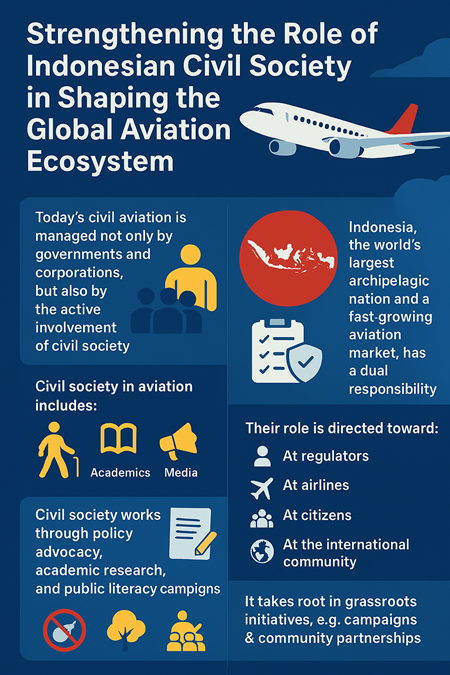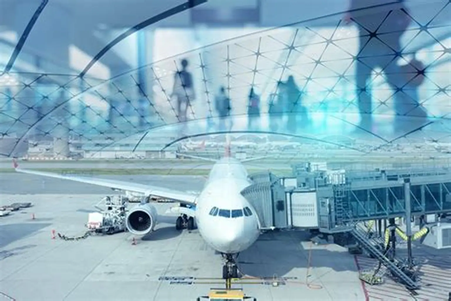In today’s interconnected world, civil aviation has become nothing less than the lifeline of modern civilization. Airplanes are no longer mere vehicles of transport; they are bridges between nations, conduits of cultural exchange, engines of economic growth, and instruments of diplomacy that shape how the world perceives a country. Yet behind these impressive achievements lies a fundamental question: how do we ensure that civil aviation is not managed solely by governments and large corporations, but also enriched, monitored, and supported by the active involvement of civil society?
Indonesia, with its unique status as the world’s largest archipelagic nation and one of the fastest-growing aviation markets, carries a dual responsibility. On the one hand, it must comply with international standards set by the International Civil Aviation Organization (ICAO). On the other hand, it must guarantee that aviation remains relevant, inclusive, and grounded in the everyday realities of its people. Civil society’s role here is crucial—not merely as passive recipients of aviation services, but as active actors who shape policy direction, scrutinize its implementation, and drive innovations that often emerge from outside bureaucratic corridors.
Civil society in the context of civil aviation is not a single, formal entity. Rather, it is a broad spectrum of social actors embedded in the lifeblood of society. They include passenger communities demanding higher safety standards, academics researching aviation security and environmental impacts, media outlets shaping public opinion through rigorous reporting, non-governmental organizations advocating for climate justice in aviation, and individual citizens who are conscious of their rights and obligations as air travellers. They are present everywhere: in major airports in Jakarta, in small airfields in remote provinces, and even in digital spaces that transcend geography. Their role emerges whenever the need arises to ensure aviation is not only technically safe, but also just, transparent, and aligned with the long-term public interest.

To whom, then, is this role directed? The answer is layered. Toward regulators, civil society pushes for accountability, ensuring regulations do not merely bow to industry pressures but also heed the voices of ordinary citizens. Toward airlines, their role manifests in demands for more environmentally friendly services, transparency of information, and fair treatment of passengers. Toward fellow citizens, the role is to educate and encourage a culture of safety, security, and shared responsibility. And ultimately, toward the international community, civil society signals that Indonesia is serious—not only in technically meeting global standards, but also in embedding participation, democracy, and sustainability within its aviation ecosystem.
This role does not remain abstract. Strategically, civil society works through policy advocacy, academic research, participation in international forums, and public literacy campaigns. Specifically, it takes root in grassroots initiatives, including campaigns against bomb jokes at airports, tree-planting programs as carbon offsets for air travel, youth education on safety culture, assistance for families of air crash victims, and community partnerships with airports to create more passenger-friendly environments. Civil society is the bridge that translates the technical jargon of global aviation into the lived realities of everyday people, presenting aviation with a more humane, inclusive, and sustainable face.
Globally, ICAO has set out five strategic objectives: safety, security, air navigation capacity and efficiency, economic development of air transport, and environmental protection. Too often, these are perceived as purely technical matters to be handled only by regulators, airlines, and the industry. Yet their success depends heavily on the support of civil society. On safety, for instance, civil society can push for transparency in accident reports and oversee the follow-up of investigation recommendations. On security, it can amplify awareness among passengers to remain vigilant without descending into paranoia. On environmental protection, civil society pressures airlines to invest in low-emission technologies and governments to take bold, regulatory steps toward greener aviation.
Indonesia stands at a crossroads, facing both opportunities and challenges. On the opportunity side, it is the largest domestic aviation market in Southeast Asia, with passenger numbers projected to grow steadily. Its geographic position, straddling two oceans and two continents, makes Indonesia a pivotal hub in global aviation routes. Yet challenges are equally stark: public literacy about aviation remains limited, safety culture is not fully ingrained, and trust in aviation institutions is sometimes fragile due to high-profile accidents. Here is precisely where civil society can fill the gap—taking on roles that neither the state nor industry can fully shoulder.
The strength of civil society lies in its agility, its closeness to communities, and its sensitivity to social change. When an air incident occurs, for example, media and civil society organizations can quickly articulate public concerns, push regulators toward transparency, and simultaneously educate the public to avoid misleading speculation. When the world demands greener aviation, grassroots organizations can initiate small but meaningful actions, such as campaigning for passengers to choose greener airlines, supporting airports that integrate renewable energy, or planting trees as offsets. In doing so, civil society helps Indonesia not merely follow global standards but actively shape the future direction of international aviation.
Still, the road ahead is not without obstacles. Industry actors may resist, perceiving civil society as a threat to profit margins. Civil society organizations themselves may face capacity limitations. Bureaucracies often still view public participation as disruptive rather than constructive. Social polarization—especially in the realm of social media—risks reducing serious aviation issues into shallow debates. This underscores the need to cultivate a healthier civil society ecosystem: one that is independent, critical, yet constructive.
The way forward must involve strengthening civil society’s role as a partner of the state in building a progressive aviation ecosystem. The government should create genuine spaces for participation, including public consultations in policymaking, transparency in accident data, and support for independent research. The industry must learn to view civil society not as an adversary, but as a strategic ally in building public trust. And civil society itself must continue to build capacity, expand international networks, and ground its advocacy in data and ethics.
Looking ahead, civil society’s role will become even more vital as new issues emerge in aviation, including digitalization, cybersecurity, and the impacts of climate change. Without civil society, these issues risk remaining the exclusive domain of technocrats, disconnected from the everyday lives of people. With civil society, the agenda becomes grounded, legitimate, and sustainable.
The ultimate reflection is simple yet profound: aviation is not only about machines, airports, or technical standards. It is also about people—how we travel, interact, and build bridges of civilization. In matters of people, the role of civil society is irreplaceable. Strengthening that role is not just a moral imperative, but a smart strategy to ensure Indonesia can face global challenges while staying true to its own social realities. Thus, Indonesia’s path toward a progressive aviation ecosystem will not be defined solely by government policies or industry innovations, but also by the courage of civil society to step up, voice the public interest, and bring forth a more just, inclusive, and sustainable face of aviation.

